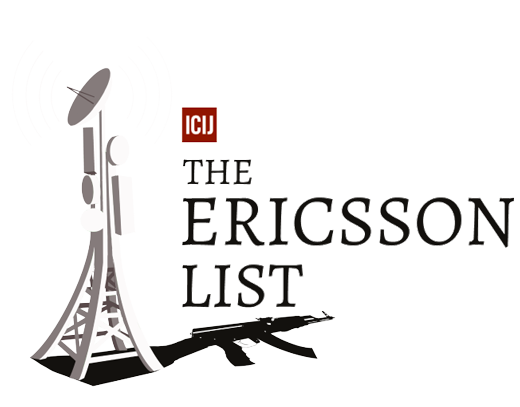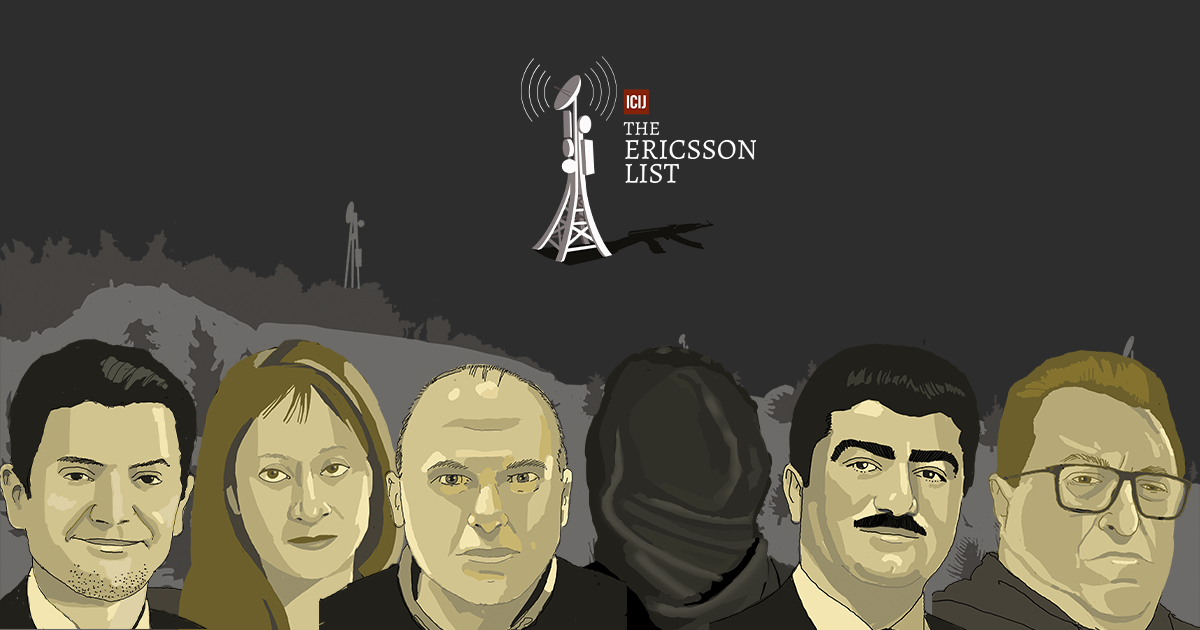DATA
Nine secret payments revealed in the Ericsson List data
Leaked documents detail sham contracts, lavish gifts, an ‘uncontrolled slush fund,’ and suspicious payments that employees of the telecom giant made via middlemen to militants in Iraq, high-ranking officials and more.
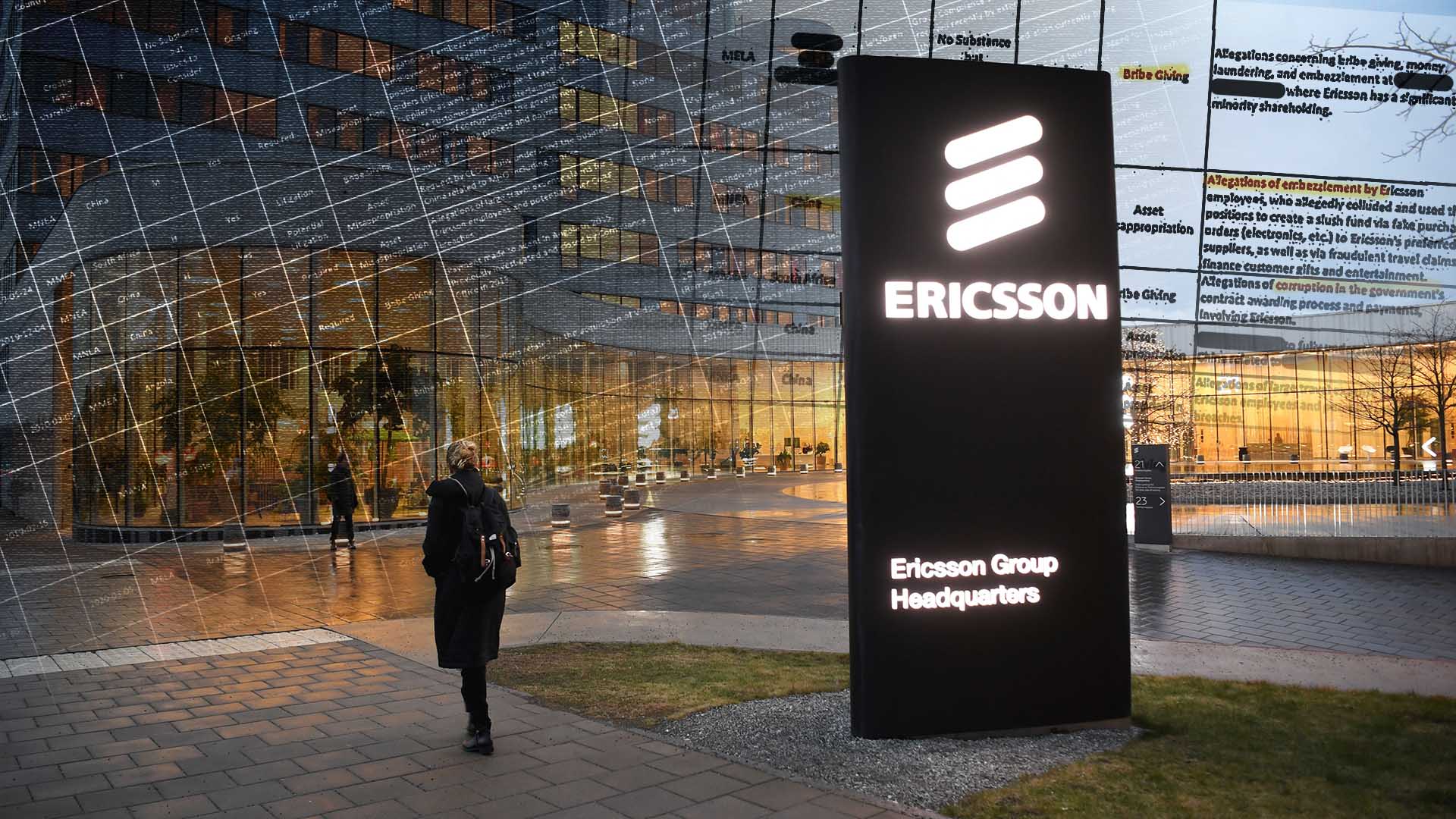
The Ericsson List investigation is based on leaked internal Ericsson compliance reports that identify a culture of corruption and graft in Iraq from 2011 to 2019. The name of the investigation refers to a spreadsheet, included in the records, that describes internal probes into alleged corrupt practices around the globe.
The International Consortium of Investigative Journalists is not releasing the leaked documents in full. We will publish only excerpts from the documents for source-protection and to safeguard the innocent. In excerpts, we name only people and companies that have been contacted for comment.
The internal review examined evidence of bribery and corruption through the lens of Ericsson’s internal “code of conduct.” Throughout the documents, the review identifies “breaches” of that code.
Here are nine notable cases described by internal investigators in the leaked files ranging from cash payments to militant groups to gifts and travel costs for high ranking officials:
1. The “Speedway”
Amount: $171,000
Date: 2016-2017
Who got paid: militant groups, potentially ISIS
Potential code of conduct breaches: Corruption and Financial Irregularities – Facilitation payments – Bribes and Kickbacks; Compliance with Laws, Rules, and Regulations – Trade compliance
What the payment was for: Safe passage for trucks carrying Ericsson equipment through ISIS areas. The route, nicknamed the “Speedway,” avoided Iraqi customs. An Ericsson contractor arranged the payments, which were in cash, according to the internal review.
What the report says:
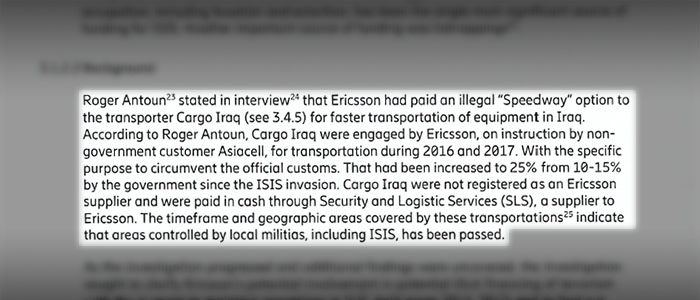
What Ericsson and others say:
- Ericsson didn’t respond to repeated requests for comment.
- SLS: Soran Othman, SLS’s chief operating officer, said that Ericsson contacted his company as part of its internal investigation and “concluded that there was no wrongdoing or criminal acts perpetrated by SLS for the contractual period under investigation.”
- Cargo Iraq: Bahez Abbas, the owner of Cargo Iraq denied paying ISIS.
- Asiacell didn’t respond to repeated requests for comment.
2. “Slush fund” for personal use by a former Ericsson employee
Amount: $308,000
Date: 2016-2018
Who got paid: Roger Antoun, a former Ericsson employee
Potential code of conduct breaches: Corruption and Financial Irregularities – Facilitation payments; Compliance with Laws, Rules, and Regulations
What the money was for: Embezzled by Roger Antoun, a former Ericsson employee, from funds intended for an Ericsson supplier in Iraq. Ericsson launched an investigation into payments made by its Iraqi employees after it discovered Antoun’s slush fund. Antoun returned the money to Ericsson.
What the report says:

What Ericsson and others say:
- Ericsson didn’t respond to repeated requests for comment.
- Roger Antoun declined to comment.
3. Payment disguised as a donation to a foundation
Amount: $50,000
Date: August 12th, 2014
Who got paid: An Ericsson employee asked that the company make a $50,000 “donation” to Kurdistan’s Peshmerga forces “for fighting ISIS,” the report says. The militia was led by Sirwan Barzani, also a major shareholder of Ericsson customer Korek and board chairman at the time. The official request indicated that the donation was to benefit refugees and displaced children in Kurdistan. The payment was routed through a charitable foundation. Internal investigators couldn’t determine the final beneficiary.
Potential code of conduct breaches: Corruption and Financial Irregularities – Bribes and Kickbacks
What the payment was for: Ericsson executives approved the payment to “get mileage” from Barzani, who was also chairman of the board of Korek, an Iraqi telecom services provider, according to the review.
What the report says:
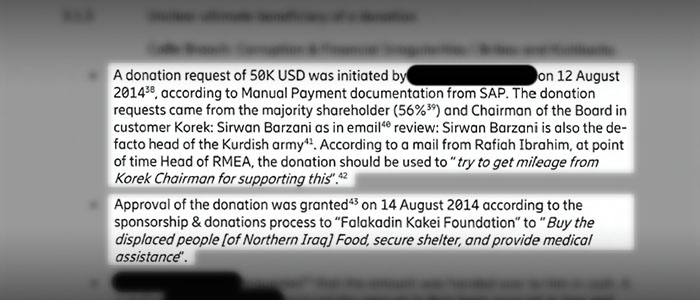
What Ericsson and others say:
- Ericsson didn’t respond to repeated requests for comment.
- Rafiah Ibrahim didn’t respond to ICIJ’s requests for comment.
- A spokesperson for Sirwan Barzani declined to answer ICIJ’s questions and said: “Sirwan Barzani is a renowned Peshmerga General who continues to fight Daesh alongside US and Coalition forces.”
4. Payments disguised as “security services” used to curry favor
Amount: $500,000
Date: Unknown
Who got paid: Intended for the CEO of Asiacell, a telecom services provider, but “ultimate beneficiary” unclear.
Potential code of conduct breaches: Corruption and Financial Irregularities – Bribes and Kickbacks; Compliance with Laws, Rules, and Regulations
What the payments were for: “Security services” in connection with the Peroza Project, which involved assembling, testing and storing telecom equipment needed for a network upgrade. The funds were intended for the CEO of Asiacell as a “commission payment”, the review found.
What the report says:
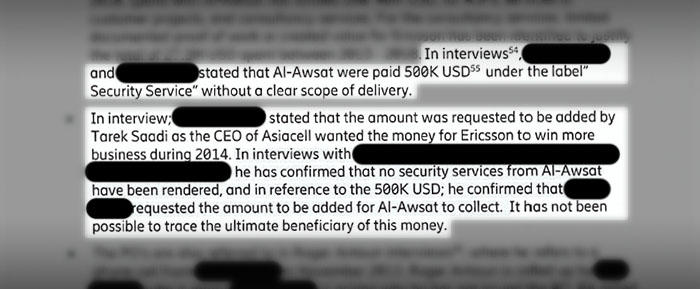

What Ericsson and others say:
- Ericsson didn’t respond to repeated requests for comment.
- Tarek Saadi declined to comment during a brief telephone call with ICIJ partner Daraj Media.
- Al Awsat’s Jawhar Surchi told ICIJ partner The Washington Post that he denied winning contracts through bribery or engaging in any sort of corruption and said he never saw Ericsson do so. Of the payment going to the Asiacell CEO, Surchi said: “this is a completely false accusation.”
- Asiacell didn’t respond to repeated requests for comment.
5. Manipulating supplier selection process and dodging trade restrictions
Amount: $10.5 million
Date: 2012-2017
Who got paid: Intended for Alawsatiya, sister company to Al-Awsat, both Ericsson contractors, but ultimate beneficiary unclear
Potential code of conduct breaches: Corruption and Financial Irregularities – Fraud & Embezzlement; Money laundering
What the payment was for: Alawsatiya, sister company to Al-Awsat, was paid $10.5 million by Ericsson, including for the “Cell on Wheels” Ministry of Defense contract. Ericsson approved Alawsatiya as a contractor following a bidding process manipulated in Alawsatiya’s favor by local Ericsson employees.
What the report says:


What Ericsson and others say:
- Ericsson didn’t respond to repeated requests for comment.
- Al Awsat’s Jawhar Surchi told ICIJ partner The Washington Post that he denied winning contracts through bribery or engaging in any sort of corruption and said he never saw Ericsson do so. Surchi described Alawsatiya as a “secondary contractor” that functioned as an extension of Al-Awsat.
- The Iraqi Ministry of Defense didn’t respond to a request for comment.
6. Parties and dinners funded by a scrapping scheme for decommissioned equipment
Amount: $188,000
Date: 2014-2017
Who got paid: Ericsson employees, contractors
Potential code of conduct breaches: Corruption and Financial Irregularities – Bribes and Kickbacks; Compliance with Laws, Rules, and Regulations – Accounting and financial reporting
What the money was for: Ericsson employees created a slush fund using unrecorded cash from a “scrapping scheme” — the sale of decommissioned equipment — to pay for hotels, dinners, bonuses for contractors, parties and personal expenses.
What the report says:
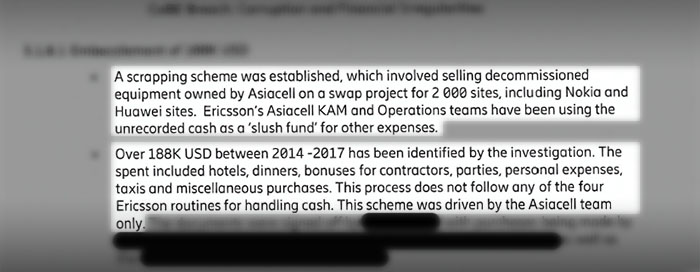
What Ericsson and others say:
- Ericsson and Asiacell didn’t respond to repeated requests for comment.
7. All-expense paid trip to Sweden for Lebanon’s telecom minister and his wife
Amount: $40,000-$50,000
Date: January 2015
Who got paid: Lebanon’s telecommunications minister, his wife and advisors
Potential code of conduct breaches: Corruption and Financial Irregularities – Bribes and Kickbacks – Gifts and entertainment – Public officials
What the money was for: Ericsson invited Lebanon’s minister of telecommunications to Sweden, along with his wife and advisors. The trip included first-class plane tickets and limousines for sightseeing.
What the report says:


What Ericsson and others say:
- Ericsson didn’t respond to repeated requests for comment.
- The Lebanese Minister of telecom at the time, Boutros Harb, told ICIJ partner the BBC that the “flight tickets, transportation and accommodation expenses were at the charge of Ericsson” but denied that “gifts nor benefits” were received.
8. ‘Business intelligence’ consultant with no clear role
Amount: $1.2 million
Date: 2007-2017
Who got paid: Rasech Barzani, a consultant
Potential code of conduct breaches: Corruption and Financial Irregularities; Public officials
What the money was for: Ericsson paid Rasech Barzani, a consultant “with no clear role” related to the influential Kurdish Barzani family. The contracts only indicated that he provided “business intelligence and facilitation to the chairman of Korek”, Sirwan Barzani.
What the report says:
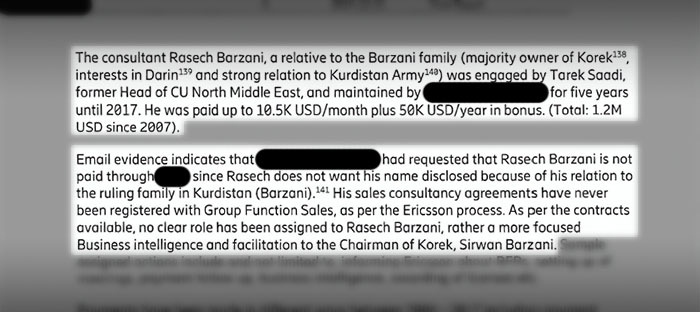
What Ericsson and others say:
- Ericsson and Rasech Barzani didn’t respond to repeated requests for comment.
- Tarek Saadi declined to comment during a brief telephone call with ICIJ partner Daraj Media.
- A spokesperson for Sirwan Barzani declined to answer ICIJ’s questions and said: “Sirwan Barzani is a renowned Peshmerga General who continues to fight Daesh alongside US and Coalition forces.”
9. Customer gifts and European trip for government officials
Amount: $97,800
Date: October 21st – November 3rd 2014
Who got paid: Ministry of Defense representatives
Potential code of conduct breaches: breach of the Ericsson Anti-Corruption Group Directive
What the money was for: Trip to Spain and Sweden for employees of Iraq’s Ministry of Defense, including gifts and entertainment, before a contract was signed.
What the report says:

What Ericsson and others say:
- Ericsson didn’t respond to repeated requests for comment.
- The Iraqi Ministry of Defense didn’t respond to a request for comment.
About the Ericsson List data
The Ericsson List investigation began with a leak of internal reports from the Swedish telecommunications company. ICIJ and its partners verified the records’ authenticity and spent months examining other documents and interviewing ex-employees, government officials, contractors and industry insiders in Iraq, London, Washington, Jordan, Lebanon and elsewhere. ICIJ’s data team reviewed all the leaked documents to consolidate details of payments made by Ericsson and what constituted a breach of its own code of conduct to complement this on-the-ground reporting.
The largest leaked report — prepared by Ericsson with the assistance of a U.S. law firm — is a summary of the accounts of 28 witnesses, 22.5 million emails and 4 terabytes of documents, and covers the years 2011 to 2019. The investigators captured and copied company computers and mobile phones.
The internal report details tens of millions of dollars in suspicious transactions, including bribery, payoffs to customers and gifts to government officials from 2011 to 2019.
ICIJ also reviewed two documents that detailed payments made in Lebanon and in Portugal, which took place as recently as 2020.
Ericsson didn’t respond to repeated requests for comment.
In addition to combing through and extracting information from the leaked documents, ICIJ also reviewed information about additional payments mentioned in court records, including the Department of Justice’s 2019 plea agreement with Ericsson. Those were treated separately and were used as part of the reporting process and to display where payments made by Ericsson were linked to allegations of misconduct.
The leaked reports in which the payments data appears collate interviews with current and former Ericsson employees and contractors, and findings from internal investigations. The report about alleged misconduct in Iraq contains inconsistencies in terms of dates, people and companies involved, final beneficiaries, and sometimes who was involved in the payments chain. This can potentially create duplicates and make it difficult to know what information to display. Employees or former employees interviewed by the report’s authors sometimes appear to contradict each other. Finally, some payments were made by companies (contractors, suppliers) Ericsson worked with, and it’s unclear whether Ericsson takes responsibility for those payments.
ICIJ scrutinized potential duplicates and contradictions in the data, and, for the above examples of payments, focused on cases that had been classified in the documents with potential code of conduct breaches (as defined by Ericsson) including corruption and embezzlement. ICIJ contacted for comment all the people and companies mentioned in these payments.
Contributors: Hamish Boland-Rudder, Emilia Díaz-Struck
